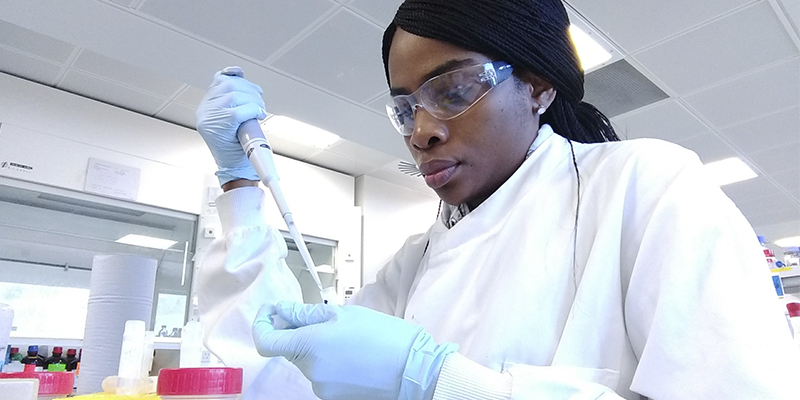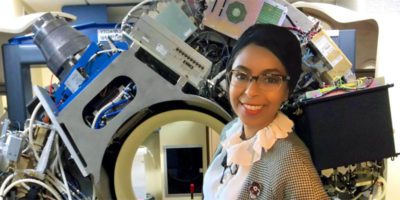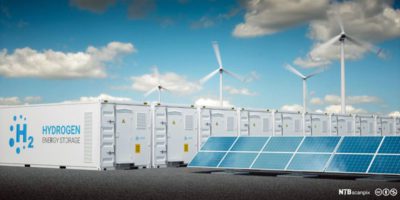Dr Orode Aniejurengho is the organiser of Soapbox Science Lagos, Nigeria, and senior scientist at GyreOx Therapeutics, focused on drug discovery. Orode is also a tutor for the MSc infection control and MSc public health courses at the University of Essex. She completed post-doctoral training at Tissue Click Ltd and the University of Oxford, where she designed an automated drug-discovery pathway that contributed to the spin-out of GyreOx.
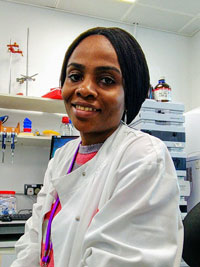
Orode is organising Soapbox Science’s event in Lagos, Nigeria, which will take place in November 2021, via Zoom webinars.
Getting the bug for science and medicine
As a child, I enjoyed glancing through the pages of my mother’s midwifery and nursing books. I think the environment I grew up in, with my mom as a nurse and surrounded by her friends who are nurses and doctors, exposed me to health and science quite early on. However, I came into my own in secondary school, when I began studying general sciences.
Growing up in Nigeria gave me the opportunity to decide whether I wanted to focus on sciences, arts, or business-focused subjects at a certain year. I focused more on the sciences.
Discovering microbiology and bioengineering
At 19, I moved to the UK to study for my A-levels, having taken biology, chemistry, physics, and mathematics. I particularly enjoyed maths and biology and dropped physics after AS-level. I got my three As, because I wanted to study medicine.
I wasn’t successful after my one and only interview, so I made the decision to study biomedical sciences at the University of Brighton. It was during this time I began to identify which aspects of science I particularly enjoyed.
I did very well in immunology and became more enthusiastic about microbiology. We’d had a brief introduction to microbiology during my A-levels, during a practical session when we swabbed the bottom of our trousers to see the type of bacteria that would grow on the agar plate. I was intrigued by the different colonies we observed on the agar plate.
However, it was not until my microbiology university lecturer, Dr Sarah Pitt, who has such great enthusiasm for microbiology, taught a session on malaria that this interest in ‘bugs’ began to grow.
I then completed a placement year at the Health Protection Agency in Colindale, which is now Public Health England. I got introduced to the world of research and molecular diagnostics and decided to go for PhD training.
Finding funding as an international student was hard. There weren’t many opportunities, so I decided to do a Masters (an MRes in bioscience) while I continued to apply for a PhD.
This gave me more training in research and finally, towards the end of my MRes, I received a PhD studentship from the same university.
It was during my PhD that I got exposed to interdisciplinary research in Prof Matteo Santin’s group. My PhD research combined skills in molecular microbiology, chemistry, and bioengineering.
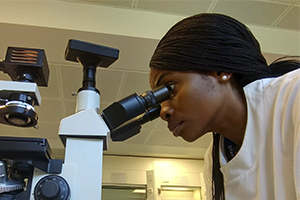
It was exciting, challenging and rewarding to apply chemistry and microbiology principles in designing a bioengineered product towards treatment.
In my first post-doctoral position, at Tissue Click Ltd, I applied my chemistry skills to design compounds that mimic the environment in which our human cells grow. The compounds help scientists to grow cells that resemble our own natural cells. These cells are used in different research areas such as drug discovery.
As lead scientist in that new spin-out from the University of Brighton, the role provided opportunities to grow my business awareness skills as I continually liaised with project partners and customers in the UK and EU.
The skills gained led to my second position, at the University of Oxford, to work on automating a pipeline for the production of druggable compounds. The work I did contributed to the spin-out of GyreOx, the drug discovery company that I currently work for.
Working in a new company means being adaptable
I currently apply knowledge in biology, information technology, chemistry, and mathematics. My current role focuses on developing compounds that will hopefully be used in cancer treatments sometime in the future.
Each day is different. One day I am setting up designs for a new robot to automate some of the manual steps involved in the synthesis of these compounds. Another day I am in the lab applying my peptide synthesis skills to make these compounds or presenting progress reports to the company’s CEO and founders.
I also apply different problem-solving skills, working with different members of the team to solve issues that arise with our equipment. Additionally, I write weekly reports and prepare protocols for different aspects of the work. It is a new company hence I must be ready to do different things daily.
Why Soapbox Science is unique in Nigeria
I became very much interested in science communication after my PhD. After speaking in 2017 at Soapbox Science Brighton, I really wanted to take that experience and celebrate women in STEM in Nigeria. To the best of my knowledge, there is no event like Soapbox Science Lagos, in Nigeria.
With the contribution of the organising team, Dr Tochukwu Ozulumba, Mrs Flora Coker, Miss Elsie Chidebe, Mrs Oluwatomi Ajayi, Dr Simiat Elias and Dr Oyinkan Adesakin, we are now in our third year showcasing the wonderful work that women in Nigeria do in science, technology, engineering, maths, and medicine.
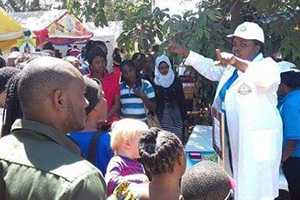
Now, in 2021, we’re organising another virtual event and the speakers are getting ready. It has been a learning experience, challenging and exciting to hear about the research that goes on in Nigeria, around antimicrobial resistance, robot technology, agriculture and the environment, breast cancer, sickle cell and many more.
We’ve had lots of very exciting topics that the public have engaged with and which they said they found to be exciting. We’ve had a lot of help from volunteers, on the ground, without them it would be very difficult to hold an event. I am very thankful to our past volunteers.
Gathering together STEM leading ladies from across Nigeria
We took advantage of the virtual aspect of our event to be able to engage with more speakers, not just in Lagos, but also in other cities in Nigeria.
We are preparing our ‘introduction to science communication’ webinar, which has been very popular for our past speakers in Nigeria. The training has been commended for how it impacted the way our speakers communicate their work to a non-specialist audience.
For some speakers, it is their first time taking part in an event like Soapbox Science. So, it’s always nice to get feedback from them. Many usually say: “When I started this, I was totally confused about how I would present my work in a way that a layperson would understand, but now I’m so happy to have been a part of it.” Statements like that encourage me and the organising team to carry on and keep expanding.
Practical arrangements
We have a Telegram group to stay in touch with both past and present speakers, which has promoted networking amongst the speakers.
I lead the training sessions on how to prepare for the Soapbox Science talks, so there’s training material to prepare for that. Also, members of the team design social media posts, handle logistics, seek sponsorship and promote our speakers on all our @soapboxlagos social media pages. We are preparing our posts that will begin in June, since our event is in the first week of November 2021.
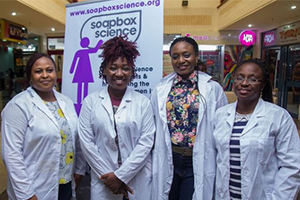
So, we are busy putting plans together to make it an informative, inspirational, and enjoyable event for both our speakers and the audience.
We are continually seeking sponsors for our live technology software, our speaker lab coats, and t-shirts. Finding sponsors is usually one of the most challenging aspects. Hence, the team and I ensure that we plan things in the most budget-friendly way.
I hope that more sponsors will come through to support women in STEM in Nigeria and showcase the wonderful research that is going on in Nigeria.
A multitude of positive effects
The impact of Soapbox Science is so positive, and I am happy to be able to continue to contribute to providing a platform that not only promotes Nigerian women in STEM but also provides a much-needed opportunity for the public to witness the exciting research that is being carried out by women in Nigeria.
It is fantastic for the younger audience to be able to connect with some of these speakers, who they may not have met if it were not for Soapbox Science.
The mix of experience among our speakers shows upcoming researchers that they too can contribute. They do not have to be professors or be working in a university; they can be PhD students or researchers in companies and still have worthwhile contributions.
We have seen mentoring relationships develop, as well as research collaborations between speakers in different institutions. Some speakers haven’t previously had the chance to be involved in such an event like this or even to showcase the importance of the work they do.
Ripple effect into in the wider community
Sometimes the wider community is not aware of the exciting and impactful research that is happening in the country. So, it is important to have this kind of outreach.
We had a lady bring her daughter to our 2019 Soapbox Science event to show her that women can be successful in science and still have a work/life balance. It’s very motivational for the young girl in secondary school or university to listen to our speakers and see how impactful a career in STEM can be. We want them to realise that these leading ladies in STEM are just like them, everyday people. We want them to learn that there are no limitations for women to have successful careers in STEM.
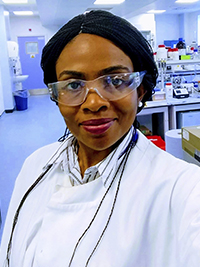
Reaching out across Nigeria and beyond
The COVID-19 pandemic has affected outreach events as we have not been able to meet face-to-face and have that interaction. However, it has been positive as it has led us to think of new ways to engage many with science. This has opened our eyes to the increasing need for and importance of technology in public engagement.
Face-to-face meetings are still important to provide much-needed personal interactions. However, in the meantime, the virtual events have enabled us to include speakers from other cities in Nigeria, where there are currently no events like Soapbox Science.
Organisations, companies and institutions are all about people
Everyone can bring something useful to the table. An environment that encourages people to grow and contribute ensures that people feel valued. It promotes growth of organisations, as without the people there are no organisations, companies, or institutions. There are many scientific and health problems in the world, and it is people who will solve them. Collaborations across and within different STEM disciplines can help to ensure we solve many of these problems faster.
It also helps to ensure we understand that the solution in one country may not apply in another part of the world, thus the diverse voices matter in solving the problems of our world whether that be in biomedical science or bioengineering.
In looking for solutions to problems, we must remain open-minded as the answers can lie not only in science but also in the arts.
People from different cultures, ethnic groups and with different technical abilities, bring a piece of their knowledge and insight to institutions that they work in. An institution that is not diverse does itself a great disservice and limits the contributions it can make to solve the multiple global problems we have.
Don’t listen to people who demotivate you, listen to mentors
When I first wanted to start in biomedical science, several people said, ‘There’s no money in science, don’t go for it.” I’m glad I did not listen to them. I identified that I loved it and still do.
I have learned that one can have joy and money in science. Perhaps more importantly, a career in science gives one an opportunity to create your own path and make an impact in society if that’s what you want. I like to be happy doing what I do, so if you have enjoyed science so far, go for it, you can have a satisfying career.
Mentors have been helpful in my journey, having someone more experienced to talk to about my thoughts. Listening to others who have been through the journey and learning from their experience was and continues to be helpful.
It helps not to repeat the same mistakes they made and equips me to manage the challenges that could arise. I went for subjects that I enjoyed, and the ones that were required that I did not enjoy as much, and I devoted the required study time and extra tuition when needed.
COVID-19 has been a double-edged sword
COVID-19 has affected so many people negatively, but it has also provided many people with insight into the different roles that one can play.
It provided enormous breakthroughs in the technology required to produce great quantities of vaccines for the world, and also in the multidisciplinary science skills required to understand the virus and identify potential drug targets.
Skills in structural biology were immensely important at the beginning of the pandemic – crystallography and cryo-electron microscopy were quickly used to provide information on how the virus enters cells, providing information on the spike protein and interaction with human cell receptors.
Molecular biology has been applied in sequencing the viral genome and better understanding its similarities to other well-known viruses.
Computational biology has been applied to identify potential drug inhibitors with the design of biological assays (analytical methods to determine the concentration or potency of a substance) to test the effectiveness of these potential drugs. While drug discovery has been growing, more disciplines have been applied to design diagnostic assays to ensure surveillance continues, in combination with vaccine development to help curb the spread of the disease.
Overall, I hope that research into COVID-19 has shown many of the multi-faceted roles that a career in drug discovery can provide. It is not only scientists in lab coats, but there are also roles related to technology, engineering, and maths.
Scientists must engage with the public to challenge fake news
The COVID-19 pandemic has highlighted the importance of scientists engaging with the public, because there have been a lot of myths about the disease.
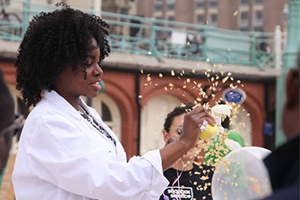
Many friends and family have contacted me to find out if some of these images and news about the disease are true or not. I would like to think that that’s because they see me as someone who is able to communicate science in a way that they can understand.
It is so important for scientists to continually engage to reduce the spread of false news about different aspects of science. We must take off our lab coats, take to the streets and engage. I think that’s one of the really great things about Soapbox Science, bringing the scientists to the streets and screens of the everyday person who may not get to interact with scientists.
Spreading the word through science communication
Personally and professionally, there is always room for growth. I am enhancing my experience in drug discovery research and look forward to the results of current research in the development of drugs for diseases that are currently difficult to treat.
I also look forward to partnering with other institutions and interested researchers to grow the Soapbox Science Lagos and Me You and The Superbugs science communication and public engagement projects that I lead.
Me You and The Superbugs, which began in 2018, is an antibiotic resistance awareness educational project aimed at increasing knowledge of the correct use of antimicrobials in Nigeria and promoting awareness of ways to reduce the spread of antimicrobial-resistant infections in the community.
Regarding Soapbox Science, I’m very hopeful that this continues and even lives beyond me. I want other women to become local organisers in their own cities in Nigeria, promoting women in science and inspiring the younger generation.
I look forward to partnering with other funding bodies that would support science communication in other cities, across the different areas of STEM.
https://www.linkedin.com/in/orodeaniejurengho/
https://www.instagram.com/orodeanie/

